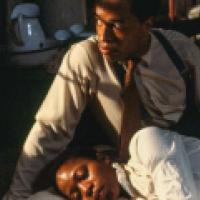Film series: Restorations and Rediscoveries

image from Shanghai Triad
Cornell Cinema carries its long tradition of screening recent film restorations and rediscovered masterpieces into the virtual realm with this series of seven films, featuring Boccaccio ’70 (1962), the legendary Italian omnibus film with works by Luchino Visconti, Mario Monichelli, Federico Fellini, and Vittorio De Sica, and starring Romy Schneider, Anita Ekberg and Sophia Loren! Professor Karen Pinkus, author of the new book Clocking Out: The Machinery of Life in 1960s Italian Cinema, will provide introductory remarks for this special presentation.
Cornell Cinema will also play virtual host to new restorations of Portuguese filmmaker Paulo Rocha’s first two films, The Green Years (1963) and Change of Life (1966), both featuring the enigmatic Isabel Ruth and a cast of non-professional actors. Winner of Best First Film at the 1964 Locarno Film Festival, The Green Years is set in Lisbon and examines the clash between working-class values and the bourgeois trappings of modern urban life. Change of Life is set in a coastal Portuguese fishing village and recalls Visconti’s epic La Terra Trema (1948), about Sicilian tuna fishers. The films have "aesthetic roots both in Italian neorealism and the French New Wave" (New York Times) and feature stunning black and white cinematography.
Speaking of stunning, we’ll also show a new restoration of Zhang Yimou’s Shanghai Triad (1995), starring the luminous Gong Li as a gang world mistress in 1930’s Shanghai. And then there’s actress Sonia Braga who stars in 1976’s Doña Flor and Her Two Husbands. The film was Brazil’s most successful of all time until recently, having been an international smash hit, and it’s easy to see why: the widowed Doña Flor marries an uptight bore with no interest in sex, only to be visited by the sexy ghost of her former carousing husband. It’s a liberating, unpretentious sex comedy that was far ahead of its time and is ripe for rediscovery.
Following Cornell Cinema’s 2016 screenings of two restored King Hu films, Dragon Inn and A Touch of Zen, Hu’s Buddhist-inflected wuxia film Raining in the Mountain (1979) gets a virtual cinema screening from a new restoration this semester. It’s a “remarkably photographed caper heist [featuring] intriguing battles of wits and minds.” (Far East Film Festival)
In November, Cornell Cinema screens two restored works about Black life in America: Cane River (1982) and The Killing Floor (1984). Truly lost for almost forty years and only recently rediscovered in a film lab, Cane River is the sole fiction film directed by Emmy Award-winning documentarian Horace B. Jenkins, who died shortly after the film’s completion. Cane River is a racially-charged love story set in Natchitoches Parish, a “free community of color” in Louisiana, featuring a budding, forbidden romance that lays bare the tensions between two black communities, both descended from slaves but of disparate opportunity—the light-skinned, property-owning Creoles and the darker-skinned, more disenfranchised families of the area.
Bill Duke’s The Killing Floor is the most “clear-eyed account of union organizing on film,” (The Village Voice) depicting the little-known true story of the WWI-era struggle to build an interracial labor union in the Chicago Stockyards, just 10 years removed from Upton Sinclair’s exposé The Jungle, which set the stage for the Chicago Race Riot of 1919.
We expect both of these titles to feature introductions by Samantha Sheppard, assistant professor in the Department of Performing and Media Arts, with an academic focus on Black cultural production and African American cinema. She will make use of the films for her Fall ’20 course Introduction to African American Cinema.








